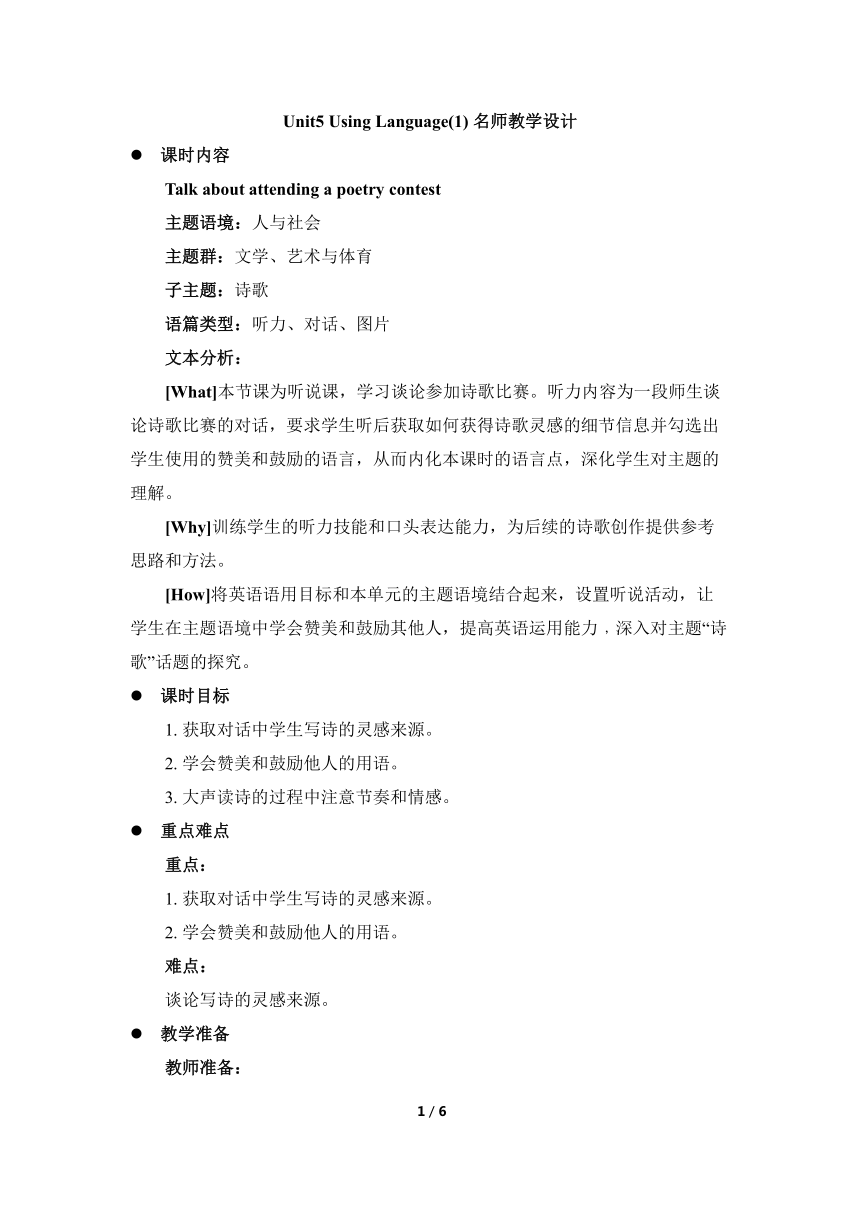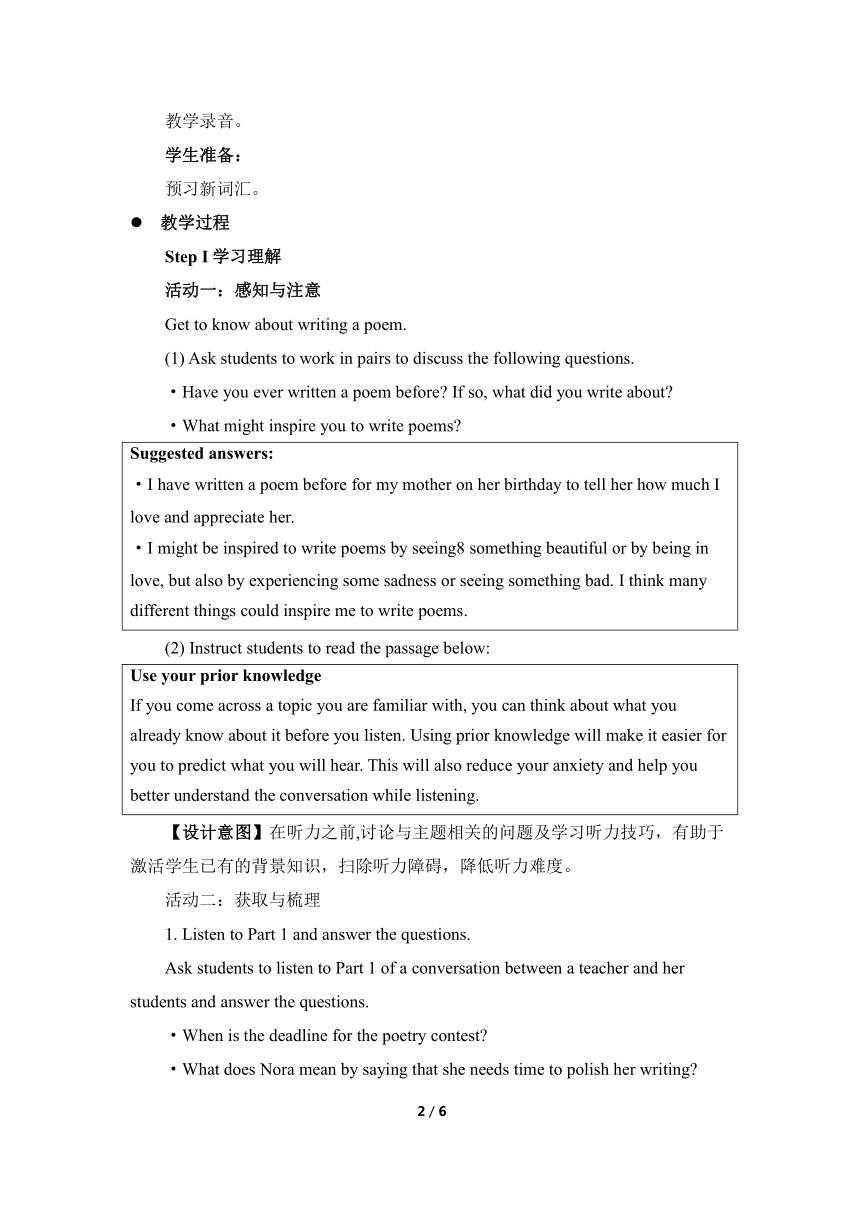人教版(2019)选择性必修第三册 Unit55 Poems Using Language(1) 名师教学设计
文档属性
| 名称 | 人教版(2019)选择性必修第三册 Unit55 Poems Using Language(1) 名师教学设计 |

|
|
| 格式 | docx | ||
| 文件大小 | 21.7KB | ||
| 资源类型 | 教案 | ||
| 版本资源 | 人教版(2019) | ||
| 科目 | 英语 | ||
| 更新时间 | 2023-03-13 00:00:00 | ||
图片预览



文档简介
Unit5 Using Language(1) 名师教学设计
课时内容
Talk about attending a poetry contest
主题语境:人与社会
主题群:文学、艺术与体育
子主题:诗歌
语篇类型:听力、对话、图片
文本分析:
[What]本节课为听说课,学习谈论参加诗歌比赛。听力内容为一段师生谈论诗歌比赛的对话,要求学生听后获取如何获得诗歌灵感的细节信息并勾选出学生使用的赞美和鼓励的语言,从而内化本课时的语言点,深化学生对主题的理解。
[Why]训练学生的听力技能和口头表达能力,为后续的诗歌创作提供参考思路和方法。
[How]将英语语用目标和本单元的主题语境结合起来,设置听说活动,让学生在主题语境中学会赞美和鼓励其他人,提高英语运用能力﹐深入对主题“诗歌”话题的探究。
课时目标
1. 获取对话中学生写诗的灵感来源。
2. 学会赞美和鼓励他人的用语。
3. 大声读诗的过程中注意节奏和情感。
重点难点
重点:
1. 获取对话中学生写诗的灵感来源。
2. 学会赞美和鼓励他人的用语。
难点:
谈论写诗的灵感来源。
教学准备
教师准备:
教学录音。
学生准备:
预习新词汇。
教学过程
Step I学习理解
活动一:感知与注意
Get to know about writing a poem.
(1) Ask students to work in pairs to discuss the following questions.
·Have you ever written a poem before If so, what did you write about
·What might inspire you to write poems
Suggested answers: ·I have written a poem before for my mother on her birthday to tell her how much I love and appreciate her. ·I might be inspired to write poems by seeing8 something beautiful or by being in love, but also by experiencing some sadness or seeing something bad. I think many different things could inspire me to write poems.
(2) Instruct students to read the passage below:
Use your prior knowledge If you come across a topic you are familiar with, you can think about what you already know about it before you listen. Using prior knowledge will make it easier for you to predict what you will hear. This will also reduce your anxiety and help you better understand the conversation while listening.
【设计意图】在听力之前,讨论与主题相关的问题及学习听力技巧,有助于激活学生已有的背景知识,扫除听力障碍,降低听力难度。
活动二:获取与梳理
1. Listen to Part 1 and answer the questions.
Ask students to listen to Part 1 of a conversation between a teacher and her students and answer the questions.
·When is the deadline for the poetry contest
·What does Nora mean by saying that she needs time to polish her writing
·Why doesn’t Pitt want to enter a poem contest
·What does George plan to do
Suggested answers: ·The deadline for the poetry contest is 24 June. ·Nora means it’s not finished, and she needs some time to change it and make it better. ·Pitt doesn’t want to enter a poem contest because he can’t think of anything to write about. ·George plans to write his poem on the weekend but only if he feels inspired.
2. Listen to Part 2.
(1) Ask students to listen to Part 2 and find out how the students will inspire themselves to write poetry.
George: _________________________________________________________
Nora: ___________________________________________________________
Pitt: ____________________________________________________________
(2) If necessary, play the recording again.
Suggested answers: George: plans to go for a hike in the countryside and sit quietly somewhere so he will notice a lot more to inspire interesting thoughts and words Nora: writes best when surrounded by familiar things and will try George’s method too Pitt: listens to music while working and writing poetry
3. Listen and tick the expressions.
Ask students to listen to the two parts again and tick the expressions they hear that are used to praise and encourage somebody.
Praising and encouraging ○That’s a good idea. ○I like that idea. ○That’s a good effort. ○You are doing well.\ ○What a great idea! ○Keep up the good work. ○I think that’s a fantastic idea. ○Do your best. ○Your ideas sound very encouraging to me. ○You know what That’s a good idea. ○Come on, you can do it. ○Give it your best shot.
Suggested answers: That’s a good idea. What a great idea! Keep up the good work. Give it your best shot.
【设计意图】通过分次播放录音,让学生获取听力材料的大意、学生写诗的灵感来源以及选出赞美和鼓励的话语。通过这个活动,获取和梳理听力的细节内容,有利于后续口语活动的开展。
Step Ⅱ 应用实践
活动三:分析与判断
Group work.
(1) Ask students to work in groups and discuss entering a poem contest like the one in the listening section.
(2) Instruct students to refer to the following questions.
·What kind of poem are you going to write
·What are the topics you would love to write about
·How will you inspire yourself to write the poem
·Will you use rhyming words in your poem Why
Suggested answers: ·I am going to write haiku. ·I would like to write about nature and wildlife. ·I will inspire myself to write the poem by visiting an ancient temple and forest in the countryside. ·I won’t use rhyming words in my poem as haiku doesn’t usually have rhyming words.
活动四:描述与阐释
Listen and practise reading the poems aloud.
(1) Instruct students to read the learning strategy below and make sure they understand the short passage.
Read poetry aloud Poetry should always be read aloud, as that is when you can hear the music of the words. When reading poetry aloud, start slowly. Find and emphasise the rhythm of the words. Begin to think about how the poem makes you feel—happy, sad, in love—and read the poem with emotion, pouring out your feelings.
(2) Play the poems on Page 55 for students and remind them to pay attention to the rhyming words and the rhythm of the poems.
(3) Inspire volunteers to read for the class.
【设计意图】通过前面听力活动语言的积累和本环节口语的输出﹐提高学生的语言表达能力。
Step III 迁移创新
活动五:想象与创造
Pair work.
(1) Ask students to find their favourite poems and read aloud.
(2) Ask students to use the expressions of “praising and encouraging” to comment and encourage their peers.
(3) Encourage some volunteers to present their pair work to the class.
【设计意图】在英语课堂教学中,设定特定的场景,给学生创造表达自己的机会,鼓励学生用赞美和鼓励的语言来评论和鼓励同伴,促进同伴有效评价的形成,使学生在轻松愉快的环境中学习,发展学生的语言运用能力。
板书设计
Unit 5 Poems Period IV Using Language (1) I. 学习理解 活动一:感知与注意 Get to know about writing a poem. 活动二:获取与梳理 1. Listen to Part 1 and answer the questions. 2. Listen to Part 2. 3. Listen and tick the expressions. Ⅱ. 应用实践 活动三:分析与判断 Group work. 活动四:描述与阐释 Listen and practise reading the poems aloud. Ⅲ. 迁移创新 活动五:想象与创造 Pair work.
2 / 2
课时内容
Talk about attending a poetry contest
主题语境:人与社会
主题群:文学、艺术与体育
子主题:诗歌
语篇类型:听力、对话、图片
文本分析:
[What]本节课为听说课,学习谈论参加诗歌比赛。听力内容为一段师生谈论诗歌比赛的对话,要求学生听后获取如何获得诗歌灵感的细节信息并勾选出学生使用的赞美和鼓励的语言,从而内化本课时的语言点,深化学生对主题的理解。
[Why]训练学生的听力技能和口头表达能力,为后续的诗歌创作提供参考思路和方法。
[How]将英语语用目标和本单元的主题语境结合起来,设置听说活动,让学生在主题语境中学会赞美和鼓励其他人,提高英语运用能力﹐深入对主题“诗歌”话题的探究。
课时目标
1. 获取对话中学生写诗的灵感来源。
2. 学会赞美和鼓励他人的用语。
3. 大声读诗的过程中注意节奏和情感。
重点难点
重点:
1. 获取对话中学生写诗的灵感来源。
2. 学会赞美和鼓励他人的用语。
难点:
谈论写诗的灵感来源。
教学准备
教师准备:
教学录音。
学生准备:
预习新词汇。
教学过程
Step I学习理解
活动一:感知与注意
Get to know about writing a poem.
(1) Ask students to work in pairs to discuss the following questions.
·Have you ever written a poem before If so, what did you write about
·What might inspire you to write poems
Suggested answers: ·I have written a poem before for my mother on her birthday to tell her how much I love and appreciate her. ·I might be inspired to write poems by seeing8 something beautiful or by being in love, but also by experiencing some sadness or seeing something bad. I think many different things could inspire me to write poems.
(2) Instruct students to read the passage below:
Use your prior knowledge If you come across a topic you are familiar with, you can think about what you already know about it before you listen. Using prior knowledge will make it easier for you to predict what you will hear. This will also reduce your anxiety and help you better understand the conversation while listening.
【设计意图】在听力之前,讨论与主题相关的问题及学习听力技巧,有助于激活学生已有的背景知识,扫除听力障碍,降低听力难度。
活动二:获取与梳理
1. Listen to Part 1 and answer the questions.
Ask students to listen to Part 1 of a conversation between a teacher and her students and answer the questions.
·When is the deadline for the poetry contest
·What does Nora mean by saying that she needs time to polish her writing
·Why doesn’t Pitt want to enter a poem contest
·What does George plan to do
Suggested answers: ·The deadline for the poetry contest is 24 June. ·Nora means it’s not finished, and she needs some time to change it and make it better. ·Pitt doesn’t want to enter a poem contest because he can’t think of anything to write about. ·George plans to write his poem on the weekend but only if he feels inspired.
2. Listen to Part 2.
(1) Ask students to listen to Part 2 and find out how the students will inspire themselves to write poetry.
George: _________________________________________________________
Nora: ___________________________________________________________
Pitt: ____________________________________________________________
(2) If necessary, play the recording again.
Suggested answers: George: plans to go for a hike in the countryside and sit quietly somewhere so he will notice a lot more to inspire interesting thoughts and words Nora: writes best when surrounded by familiar things and will try George’s method too Pitt: listens to music while working and writing poetry
3. Listen and tick the expressions.
Ask students to listen to the two parts again and tick the expressions they hear that are used to praise and encourage somebody.
Praising and encouraging ○That’s a good idea. ○I like that idea. ○That’s a good effort. ○You are doing well.\ ○What a great idea! ○Keep up the good work. ○I think that’s a fantastic idea. ○Do your best. ○Your ideas sound very encouraging to me. ○You know what That’s a good idea. ○Come on, you can do it. ○Give it your best shot.
Suggested answers: That’s a good idea. What a great idea! Keep up the good work. Give it your best shot.
【设计意图】通过分次播放录音,让学生获取听力材料的大意、学生写诗的灵感来源以及选出赞美和鼓励的话语。通过这个活动,获取和梳理听力的细节内容,有利于后续口语活动的开展。
Step Ⅱ 应用实践
活动三:分析与判断
Group work.
(1) Ask students to work in groups and discuss entering a poem contest like the one in the listening section.
(2) Instruct students to refer to the following questions.
·What kind of poem are you going to write
·What are the topics you would love to write about
·How will you inspire yourself to write the poem
·Will you use rhyming words in your poem Why
Suggested answers: ·I am going to write haiku. ·I would like to write about nature and wildlife. ·I will inspire myself to write the poem by visiting an ancient temple and forest in the countryside. ·I won’t use rhyming words in my poem as haiku doesn’t usually have rhyming words.
活动四:描述与阐释
Listen and practise reading the poems aloud.
(1) Instruct students to read the learning strategy below and make sure they understand the short passage.
Read poetry aloud Poetry should always be read aloud, as that is when you can hear the music of the words. When reading poetry aloud, start slowly. Find and emphasise the rhythm of the words. Begin to think about how the poem makes you feel—happy, sad, in love—and read the poem with emotion, pouring out your feelings.
(2) Play the poems on Page 55 for students and remind them to pay attention to the rhyming words and the rhythm of the poems.
(3) Inspire volunteers to read for the class.
【设计意图】通过前面听力活动语言的积累和本环节口语的输出﹐提高学生的语言表达能力。
Step III 迁移创新
活动五:想象与创造
Pair work.
(1) Ask students to find their favourite poems and read aloud.
(2) Ask students to use the expressions of “praising and encouraging” to comment and encourage their peers.
(3) Encourage some volunteers to present their pair work to the class.
【设计意图】在英语课堂教学中,设定特定的场景,给学生创造表达自己的机会,鼓励学生用赞美和鼓励的语言来评论和鼓励同伴,促进同伴有效评价的形成,使学生在轻松愉快的环境中学习,发展学生的语言运用能力。
板书设计
Unit 5 Poems Period IV Using Language (1) I. 学习理解 活动一:感知与注意 Get to know about writing a poem. 活动二:获取与梳理 1. Listen to Part 1 and answer the questions. 2. Listen to Part 2. 3. Listen and tick the expressions. Ⅱ. 应用实践 活动三:分析与判断 Group work. 活动四:描述与阐释 Listen and practise reading the poems aloud. Ⅲ. 迁移创新 活动五:想象与创造 Pair work.
2 / 2
